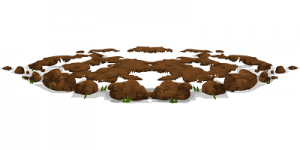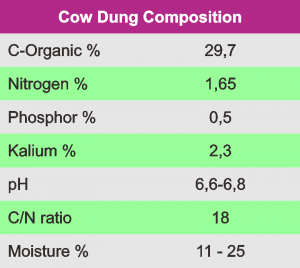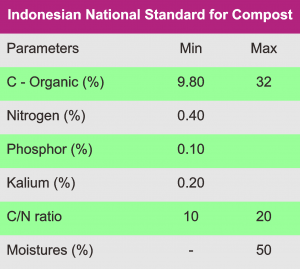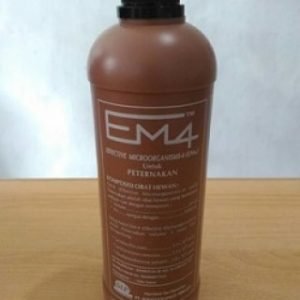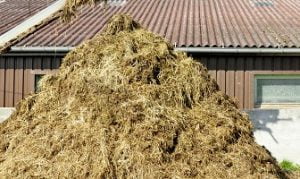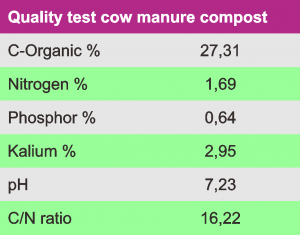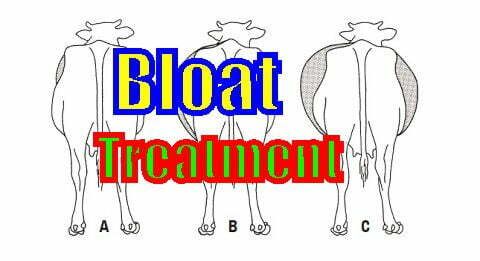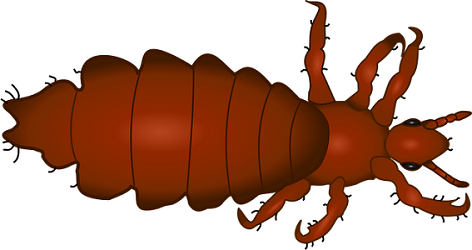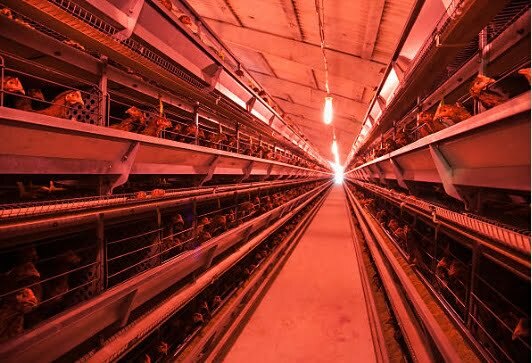I will make a little intro this time. This I have to do, because I think it is necessary to write it. Ok, lets go.
The weakness of cow manure compost
All the farmers in the village know that organic fertilizer is better, right?
But why?
Although they know that the organic fertilizers are good, in fact, few are willing to use them.
It was as if the farmer was hypnotized with inorganic fertilizer. Such an insecurity if the agricultural products are not good if not using inorganic fertilizers.
Indeed, chemical fertilizer results can be directly seen in one planting period. While organic fertilizer, the reaction is slower.
In addition, chemical fertilizers are faster and more practical. Whenever you need it, just buy it and it can be used immediately.
The availability is also equitable. Almost in every village there are sellers. Although sometimes rare too.
Chemical fertilizers are also packed neatly, not dirty and farmers do not need large space to store them.
This is what I think is the weakness of organic fertilizer, especially in the countryside.
First, not all farmers have cattle. Although there are, usually only one or two tails.
So, not all farmers have a source of organic fertilizer for agriculture. Especially for cow manure compost.
Second, most farmers do not have room to store this organic fertilizer.
Of course. The data from PT. Petrokimia Gresik for example. Per hectare, it takes 300 kgs for the basic fertilizer of rice.
It consists of 100 kgs urea, 125 kgs of SP-36 and 75 kgs of KCL. It only takes 6 bags of fertilizer. If kept in the corner of the house, is enough.
Imagine if you have to use cow manure compost as fertilizer. For basic fertilizer, it takes a lot. Need to tons in amount if you want the same results.
Five tons of cow manure, when it becomes compost, the volume is getting very high. This is because the water content is sufficiently reduced.
If every house in the village has this kind of fertilizer stock, it seems like it will be a strange sight …
Third, the lack of information about the processing of organic fertilizer.
Stacked livestock manure is not fully utilized as fertilizer.
Because every day there is new cow’s manure produced. Then stacked at the top.
When the time of fertilization arrived, only the bottom of the fertilizer that has become compost. While the upper part, not yet.
This may be the reason why organic fertilizer performance is not as fast as inorganic fertilizers. Because the fertilizer is still in raw condition and not ready to be absorbed by the plant.
Importance of organic fertilizer
Inorganic fertilizer has been providing considerable benefits to farmers.
Its practical, fast and effective products can facilitate farmers in improving their agricultural production.
The role of increasingly sophisticated technology indeed supports and aims for it. Fertilizers, pesticides, herbicides, and many other products available on the market.
However, concerns over the long-term effects of the use of fertilizers and chemical drugs are beginning to be felt.
The use of chemical fertilizers, pesticides, herbicides and chemical drugs harmful to health, if used continuously can lead to environmental pollution.
In addition, long-term effects can reduce the function and quality of the environment.
For that, the use of organic fertilizer and organic farming is expected to be widely used so that the environment is not polluted and the quality of the soil does not decrease its function.
Cow dung composition
From several research journals, nutrient content of cow dung is slightly different.
This possibility is due to the type of feed consumed.
Cows that feed concentrate and straw, the content of nutrients may be slightly different from the cows that feed dominant grass.
From a research source, nutrient content of cow dung (from dry weight) is as follows. [1]
While in other sources, the amount of nitrogen, phosphorus and potassium and water content in cow manure are 0.4%, 0.2% and 0.1% and 85% respectively. [2]
There is still something else. If the source of this one mentions that the nutrient content of cow dung is as follows.
The amount of nitrogen between 0.4 – 1%, phosphorus between 0.2 – 0.5%, potassium between 0.1 – 1.5% and water content 85 – 92%. [3]
C / N ratio of cow dung is quite low. Therefore, the manufacture of compost from cow dung will be better results if added another material. For example, rice straw.
Standard quality of cow manure compost
In the above paragraph, I have mentioned that cow manure compost has deficiencies compared to chemical / inorganic fertilizers.
Therefore, it is necessary to do optimization steps so that it can compete with inorganic fertilizer.
How to make manure is quite easy and the cost is also not much, just need to spend time, energy and confidence.
According to the Indonesian National Standard, the nutrient content present in organic fertilizer should be as follows:
Standard above we will use as a reference, whether the compost from cow dung that we make is good or not.
How to make cow manure compost with EM4
How to make it pretty easy. The ingredients are cow dung and there are other additives. The additional ingredients are rice straw.
According to research, the addition of straw can provide better compost potency.
Then the starter for fermentation used is EM4. Prior to use for compost fermentation, EM4 is activated first.
How to activate it often I describe in my previous article. Please read if you want to see. It links the article.
How to make a compost from goat manure with EM4.
Then, for the steps to make cow manure compost are as follows:
1. The comparison between cow dung and rice straw is 60:40. This comparison is not standard. If you want to make is with 50:50 or 40:60 also be allowed.
So, if the cow dung as much as 60 kgs, then the rice straw is 40 kgs. So the total is 100 kgs.
While EM4 for the amount of compost material is as much as 100 ml. Do not forget to activated it first.
2. This is just a suggestion, rice straw should be chopped first. This will further maximize the composting process.
But usually, the straw is already mixed with cow dung, and difficult to separate.
If it is not possible, no chopping is also not a problem.
3. Furthermore, between cow dung and straw mixed until fairly evenly. After that, it watered with EM4 that has been active.
The trick is like this.
Little – by – little compost material spread in thin layer. Then, the surface is sprayed with EM4 until evenly distributed.
Next, above the first layer is added with the compost material again and doused with em4 again.
And so on until the compost material runs out.
4. After all the ingredients are finished, the compost is closed tightly for at least 4 weeks. Every 3 days, compost needs to be flipped through for aeration.
Done. If the pile is held and it feels no heat, then the compost from cow dung is ready for use.
Quality and cow manure compost composition
The results of the quality test of cow manure compost above are as follows.
I think, the results are pretty good.
Now, just apply it and make your own compost.
So, for this article I think quite up here.
Please experiment on your own, good luck. Do not forget to share it to others, if you did.
 JOYNIM FARM Goat Farming, Cattle Farm, Laying Hens, Quail Farm, Gardening
JOYNIM FARM Goat Farming, Cattle Farm, Laying Hens, Quail Farm, Gardening

